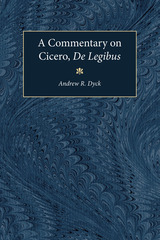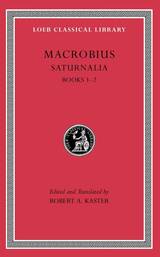
Surprisingly, de Legibus has been one of Cicero's most neglected works. Andrew R. Dyck's commentary is the first to appear on the complete work in well over one hundred years. Dyck provides a detailed interpretation and sets the essay into the context of the politics and philosophical thought of its time. While previous commentaries focused primarily on grammar and textual criticism, this one also seeks to relate Cicero's text to the political, philosophical, and religious trends of his day. The author identifies the influences on Cicero's thinking and analyzes the relation of this theoretical treatise to his other works. This commentary is based on a new text, worked out in consultations between the author and Jonathan Powell of Royal Holloway, London.
Andrew Dyck is Professor of Classics, University of California at Los Angeles.

An antiquarian’s festival.
The Saturnalia, Macrobius’ encyclopedic celebration of Roman culture written in the early fifth century AD, has been prized since the Renaissance as a treasure trove of otherwise unattested lore. Cast in the form of a dialogue, the Saturnalia treats subjects as diverse as the divinity of the Sun and the quirks of human digestion while showcasing Virgil as the master of all human knowledge from diction and rhetoric to philosophy and religion.
The new Latin text is based on a refined understanding of the medieval tradition and improves on Willis’ standard edition in nearly three hundred places. The accompanying translation—only the second in English and the only one now in print—offers a clear and sprightly rendition of Macrobius’ ornate Latin and is supplemented by ample annotation. A full introduction places the work in its cultural context and analyzes its construction, while indexes of names, ancient works cited in both text and notes, and topics make the work more readily accessible than ever before.

An antiquarian’s festival.
The Saturnalia, Macrobius’ encyclopedic celebration of Roman culture written in the early fifth century AD, has been prized since the Renaissance as a treasure trove of otherwise unattested lore. Cast in the form of a dialogue, the Saturnalia treats subjects as diverse as the divinity of the Sun and the quirks of human digestion while showcasing Virgil as the master of all human knowledge from diction and rhetoric to philosophy and religion.
The new Latin text is based on a refined understanding of the medieval tradition and improves on Willis’ standard edition in nearly three hundred places. The accompanying translation—only the second in English and the only one now in print—offers a clear and sprightly rendition of Macrobius’ ornate Latin and is supplemented by ample annotation. A full introduction places the work in its cultural context and analyzes its construction, while indexes of names, ancient works cited in both text and notes, and topics make the work more readily accessible than ever before.

An antiquarian’s festival.
The Saturnalia, Macrobius’ encyclopedic celebration of Roman culture written in the early fifth century AD, has been prized since the Renaissance as a treasure trove of otherwise unattested lore. Cast in the form of a dialogue, the Saturnalia treats subjects as diverse as the divinity of the Sun and the quirks of human digestion while showcasing Virgil as the master of all human knowledge from diction and rhetoric to philosophy and religion.
The new Latin text is based on a refined understanding of the medieval tradition and improves on Willis’ standard edition in nearly three hundred places. The accompanying translation—only the second in English and the only one now in print—offers a clear and sprightly rendition of Macrobius’ ornate Latin and is supplemented by ample annotation. A full introduction places the work in its cultural context and analyzes its construction, while indexes of names, ancient works cited in both text and notes, and topics make the work more readily accessible than ever before.
READERS
Browse our collection.
PUBLISHERS
See BiblioVault's publisher services.
STUDENT SERVICES
Files for college accessibility offices.
UChicago Accessibility Resources
home | accessibility | search | about | contact us
BiblioVault ® 2001 - 2024
The University of Chicago Press









